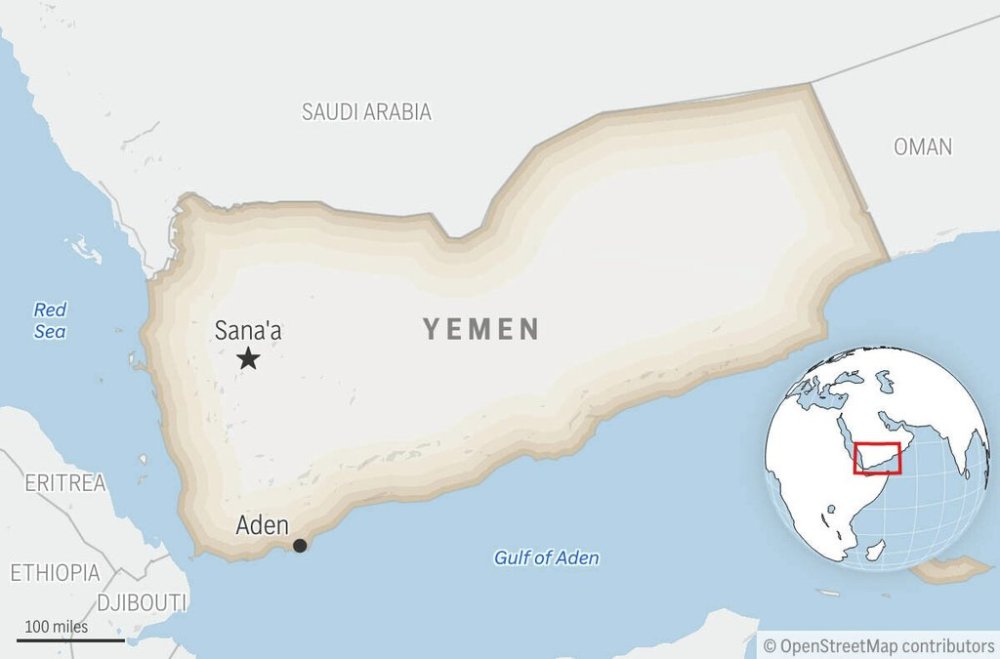Protests in an eastern Yemen province intesify over prolonged power outages
Advertisement
Read this article for free:
or
Already have an account? Log in here »
To continue reading, please subscribe:
Monthly Digital Subscription
$0 for the first 4 weeks*
- Enjoy unlimited reading on winnipegfreepress.com
- Read the E-Edition, our digital replica newspaper
- Access News Break, our award-winning app
- Play interactive puzzles
*No charge for 4 weeks then price increases to the regular rate of $19.00 plus GST every four weeks. Offer available to new and qualified returning subscribers only. Cancel any time.
Monthly Digital Subscription
$4.75/week*
- Enjoy unlimited reading on winnipegfreepress.com
- Read the E-Edition, our digital replica newspaper
- Access News Break, our award-winning app
- Play interactive puzzles
*Billed as $19 plus GST every four weeks. Cancel any time.
To continue reading, please subscribe:
Add Free Press access to your Brandon Sun subscription for only an additional
$1 for the first 4 weeks*
*Your next subscription payment will increase by $1.00 and you will be charged $16.99 plus GST for four weeks. After four weeks, your payment will increase to $23.99 plus GST every four weeks.
Read unlimited articles for free today:
or
Already have an account? Log in here »
Protests in eastern Yemen intensified for a third consecutive day as residents demonstrated Tuesday against long power outages during scorching heat.
Hundreds of protesters in Mukalla, the capital city of Hadramout province, set up tents in the streets, blocked roads and chanted against the internationally recognized government based in Aden as they demanded the return of electricity, eyewitness Salem bin Mubarak told The Associated Press.
The protests erupted Sunday in response to electricity blackouts that now last over 19 hours a day. The repeated outages this summer are due to fuel shortages, according to electricity officials with Aden’s electricity institution, whose names were withheld because they were not authorized to speak publicly.

At the peak of the demonstrations, protesters set up fire to tires and blocked the coastal city’s port, security official Ahmed al-Dahdouh said. Protesters also besieged the building of the Public Corporation of Electricity in Hadramout Coast Tuesday afternoon.
The fuel shortages have been caused by a lack of diesel and petroleum imports, corruption and budget deficits. The blackouts interrupt water supplies and increase fuel prices, according to a report issued Tuesday by SARI Global, a center providing geopolitical and security analysis for NGOs and companies.
“Though economic decline and service interruptions are familiar realities in southern Yemen, the sheer scale of Mukalla’s electricity crisis and the rapid spread of unrest mark a dangerous tipping point,” the report said, warning of further instability.
SARI Global said fuel shortages also are attributed to disrupted fuel transport routes to Muakalla and closed power plants, while fuel supplier PetroMasila has delivered fuel quantities on a weekly basis instead of daily.
Hadramout’s population has long suffered from the lack of daily life necessities, including electricity, water, proper education and health care, as well as local currency deterioration, Hadramout Tribes Confederacy, an association representing the province’s tribes, said in a statement Monday.
“These are the main reasons for what is currently happening in the capital, Mukalla, and some of the districts, which is the result of accumulations that Hadhramaut is still suffering from,” the statement said, citing internal corruption as part of the problem.
Some regions in Yemen have experienced water insecurity in addition to power outages, according to the Norwegian Refugee Council. The organization said in a statement Tuesday that low seasonal rainfall has wosened an already dire situation for Yemenis trying to access clean water in rural areas and cities, with rainfall expected to decline by 40%.
Yemeni journalist Abduljabar Bajabeer, the general director of TV3ad channel, was arrested Monday during the protests on unspecified charges and jailed in Mukalla, according to the Committee to Protect Journalists, which called for his immediate release.
“Bajabeer’s arrest is yet another example of the systematic campaign to silence journalists in Hadramout and the areas controlled by Yemen’s Internationally Recognized Government (IRG),” CPJ Program Director Carlos Martinez de la Serna said in a statement.
Yemen’s ruinous civil war began in 2014 when the Houthis seized the capital, Sanaa and much of northern Yemen, forcing the internationally recognized government into exile. A coalition led by Saudi Arabia and including the United Arab Emirates intervened the following year in an attempt to restore the government.
The UAE-backed Southern Transitional Council controls much of the south, which has been fractured by the civil war. The council advocates for the south’s secession and has its own militia forces allied to the internationally recognized government fighting the Houthis.

